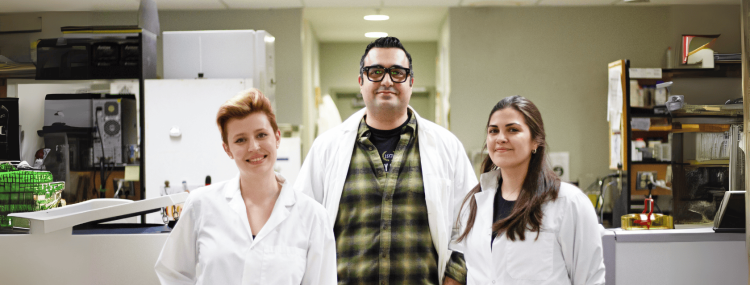New findings from University of Guelph researchers could help unlock better treatments for leukemia and tuberculosis, two deadly diseases that affect millions worldwide. These studies focus on specialized enzymes that destroy damaged proteins, a process essential for disease survival, and reveal how these enzymes can be switched on or off.
In studies recently published in Nature Communications and Proceedings of the National Academy of Sciences, U of G molecular biologists investigated two types of proteases enzymes that act like molecular scissors, cutting up damaged or unnecessary proteins to keep cells healthy.

Left to right: Madison Turner, Dr. Siavash Vahidi, Monica Goncalves
These enzymes are essential for the survival of cells involved in acute myeloid leukemia (AML), one of the most devastating types of leukemia, and tuberculosis (TB), the leading cause of death from a single infectious agent worldwide.
Shutting off these enzymes could offer a new treatment avenue, but so far, their complexity and tendency to shapeshift into active and inactive states have made them difficult to study.
For the first time, however, U of G researchers captured these enzymes through advanced biochemical and structural biology techniques. They now understand how these enzymes look, behave and switch into "on" and "off" states, laying the foundation for the next generation of drug treatments.
"If we can trap these enzymes in their active and inactive states using small molecule drugs, there is a chance that we can make some very potent therapeutics," says principal investigator Dr. Siavash Vahidi, professor in the Department of Molecular and Cellular Biology.
Over a million people die of TB every year. Antibiotic treatments take between six months to a year, with the side effects so severe that not many finish their treatment protocols. As for AML, the life-threatening cancer is aggressive and progresses rapidly. The outcome for most patients remains poor, with 90 per cent of older patients succumbing to the disease within two years.
Results from this study could lead to more potent or more selective treatments that are less likely to trigger resistance, Vahidi says. This is especially critical for TB as it has drug-resistant strains that are difficult to treat.
Capturing shapeshifting enzymes
Leading the projects were PhD students Madison Turner and Monica Goncalves, who Vahidi says have been essential to this work and are "the core pillars of the lab."
Turner studied an enzyme called the proteasome, which is found in Mycobacterium tuberculosis, the bacterial species that causes TB; Goncalves studied the ClpP protease, found in human cancer cells.
"The enzyme I studied has a naturally inhibited state in which it no longer works," says Turner. "Developing a drug that could stabilize this inhibited state - that is the real long-term value of this work."
Surprisingly, Goncalves discovered chemicals meant to inhibit the cancer enzyme actually activate it at low doses.
"Drugs that try to inhibit the business end' of the enzyme have the opposite effect," Goncalves says. "This means you have to have the most optimal levels of your drug therapy - because of this unintended effect."
These longstanding questions in the field have resisted answers because of their sheer complexity, says Vahidi.
"But we try every day," he says. "And we do it at a high level of detail, paying attention to these minute but very important mechanistic insights that other labs have missed."
U of G lab five years in the making
Vahidi began his lab in June 2020, just months after the COVID-19 pandemic began. "That was the worst time to start," he says.
Now, the team has grown substantially, with the mission of investigating very large and challenging protein systems to solve significant problems, particularly those enzymes and protein complexes that go uninvestigated.
That work has paid off through publication in prestigious journals.
"If somebody had told me that in five years' time, we were going to be at this stage, I would simply say they were dreaming," Vahidi says. "We are here because of the hard work of a lot of people, these students, many exceptional collaborators like Dr. Natalie Zeytuni (McGill University) and her outstanding PhD student Adwaith Bini Bose, as well as the Canadian Institutes of Health Research (CIHR), which funded the research."
Other research projects in Vahidi's lab focus on using AI to design custom proteins that can change the behaviour of targeted enzymes, like those involved in COVID-19.
"We are not too far from the translational side of things," Vahidi says, "where we can begin to leverage our mechanistic insights to actually help someone in a hospital bed, for example, or to slow down or potentially even prevent the next pandemic."













